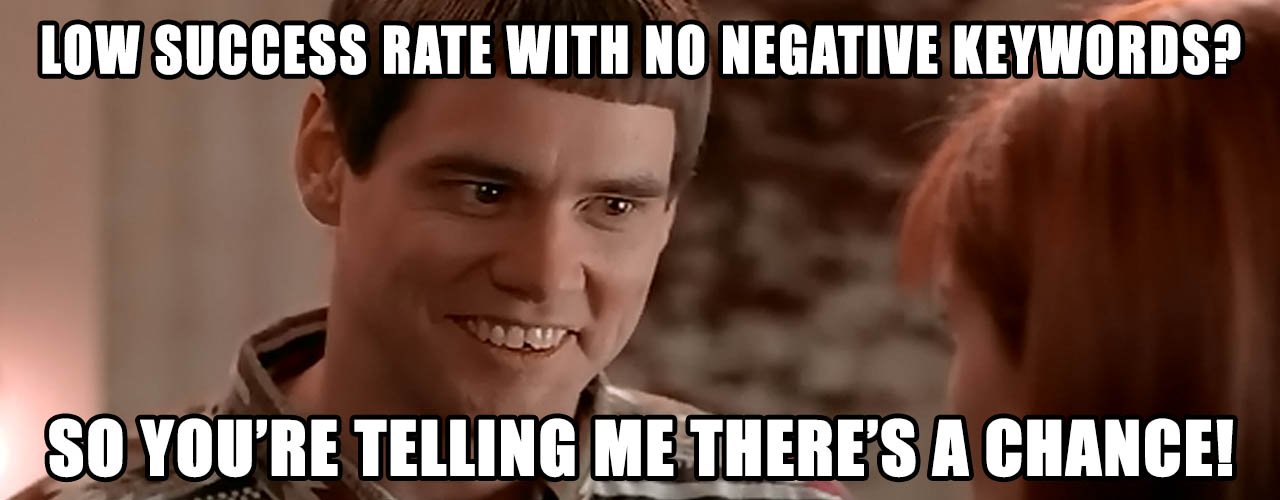“Adwords is tough for my industry,” a client told me once. In the scientific technology field, he said he was having trouble blocking his ads from being triggered by people who weren’t looking to buy his product. “It’s all kids my daughter’s age doing research for their science projects,” he said. “I don’t think it’s worth paying for these clicks.”
I’ve heard the same thing countless times, and he’s right–he shouldn’t have to pay for clicks that aren’t coming from qualified buyers. But it really doesn’t have to be that way. Knowing your way around one of Google’s most important Adwords tools, the negative keywords list, can help you make your ads more targeted and your campaign more successful.
Determine Your Need
Negative keywords–sometimes referred to as negative match types–are the words that you don’t want to be triggering your ad. These can be products or services related to yours that you don’t sell, or discontinued products that you no longer offer. Or they can be words that people type in when they’re trying to find another company that has a similar name as yours.
Aside from the obvious, negative keywords are also great tools for strategically targeting the type of clientele that brings you the most money per job. You can block yourself from coming up under a keyword related to one of your more menial services, which will allow you to put most of your budget towards marketing the higher-paying jobs. You can also block out words like “cheap,” or “free,” queries that wouldn’t be blocked out otherwise if you are using broad match types.
Compile The List
If you’ve ever tried to build your own campaign, you can probably relate to the issue of trying to think of all the different ways that people are searching for your industry. You probably looked through the Keyword Planner, had a brainstorming session with your colleagues, or talked to your website builder about the keywords you initially included in your website copy. Building a negative keyword list is a task that requires creativity as well, but because there is more data to draw from, it can get even more technical.
In the beginning, one of the best ways to get ideas is to type a few of your keywords into the Keyword Planner and examine the list of ideas that come up. Add any of the words that come up that aren’t transactional or relevant to your negative keyword list. A good rule of thumb is to look for words involving your keywords that are related to employment, training, or research, because these will be less likely to convert.
After you’ve had your campaign running for about a few weeks or a month, the next step is to take a look through your Search Query Report. This is the place in your MCC where you can view what people were typing into Google when they clicked on your ad, and how much these clicks cost you. If you have conversion tracking set up, you can even see which of these clicks led to a conversion. Start by adding the more outlandish, unrelated queries–and there will be some interesting ones–to your negative keyword list, and then move on to include any relevant keywords that aren’t performing as well as you want. What better way to make sure all of your ad spend is working for you than to target it as much as possible toward high-converting clicks?
Know When “No” Means No
However, the mantra “Everything in moderation” does still apply to negative keywords. It’s ok to be liberal with this list–Google’s limit is 10,000, which allows you lots of leeway–but one of the common pitfalls of negative keywords is blocking your website from too much potential business. Even though you want your campaign to be successful from the get-go, it’s not a good idea to be too targeted before you know what will perform and what won’t perform.
If you look for help online, you’ll find a lot of different ideas about how to get creative with your negative keyword list, including negative keyword generators and pre-fabbed industry lists. But the reality is that every business is different. Take generalized advice with a grain of salt, use your resources wisely, and don’t be afraid to ask a search engine marketing company for help. Someone who is Google-certified can probably offer you some more personalized guidance in terms of how to structure your negative keyword list. If you need extra help, many agencies like ours provide AdWords audits and reviews.
Build As You Go
Along with all the different tools that Google has in place to help you see the best results with your Adwords campaign, the underlying requirement for success is that the campaign receives regular attention and optimization. Don’t be afraid to use the knowledge you gain from each new week of running Adwords toward improving your campaign. You should be looking at the campaign often, tracking your conversions, and monitoring your keywords to target the ones that yield a higher ROI.
In a campaign that is built to generate conversions, it’s hard to.

Logical Position, an Inc. 500 digital agency supporting 5,000+ clients across North America. LP is the proud recipient of Google’s Lead Generation Premier Partner of the Year and Microsoft's Global Channel Partner of the Year 2024! The award-winning agency offers full-service PPC management, SEO, Paid Social, Amazon and Creative Services for businesses large and small. As a Google Premier Partner, Microsoft Elite Partner & Meta Business Partner, LP is in the top 1% of ad spend managed across platforms.



